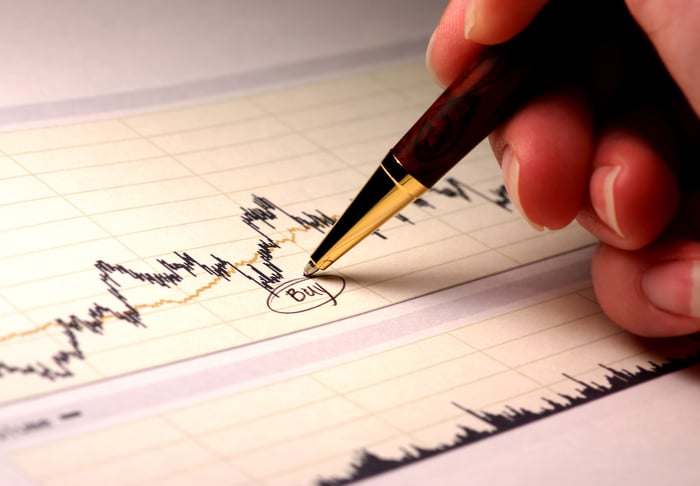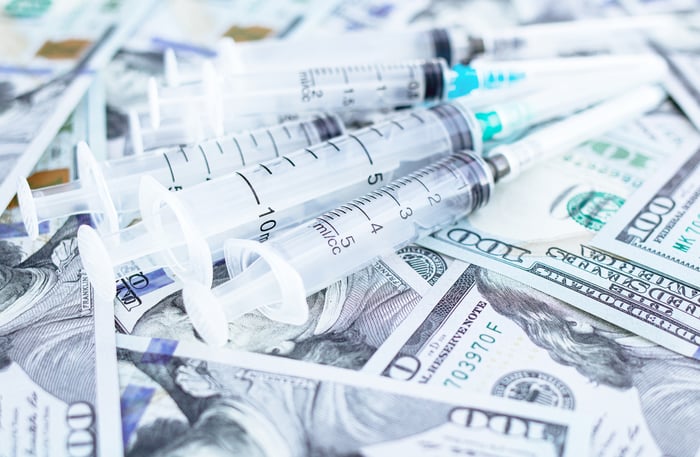Warren Buffett is arguably the greatest investor alive today. The CEO of Berkshire Hathaway (BRK.A -0.38%) (BRK.B -0.40%) has overseen an average annual return in his company's stock of 20.3% in a 55-year stretch between 1965 and 2019. For you math-phobes out there, this works out to an aggregate gain of 2,744,062%. Put another way, $100 invested into Berkshire Hathaway at the end of 1964 would have made you a multi-millionaire by December 2019.
The Oracle of Omaha has a knack for identifying plain-as-day values and hanging onto companies with sustainable competitive advantages for long periods of time. In other words, when Warren Buffett buys or sells a stock, Wall Street and retail investors pay very close attention.
In 2021, I believe it's likely that Buffett or his investing lieutenants (Todd Combs and Ted Weschler) will look to add to the following four positions.

Image source: Getty Images.
Bank of America
To begin with, don't be surprised if Warren Buffett adds to Berkshire's No. 2 position, Bank of America (BAC -1.65%). Typically capped at a 10% stake in a publicly traded bank, the Federal Reserve Bank of Richmond gave Buffett's company the OK last year to up its stake in BofA to as much as 24.9% without triggering bank holding company rules and regulations. That's a green light for Buffett and his team to get aggressive with what's clearly their favorite bank stock.
Among money-center banks, Bank of America is the most interest-sensitive. This means that as the yield curve steepens during the economic recovery, and the Federal Reserve begins raising interest rates again in 2024, BofA will see the biggest increase in interest income among big banks. Buffett loves to set his portfolio up in advance of inevitable economic recoveries.
Bank of America has also done an excellent job of controlling its expenses. The company's investments in digitization are paying off with more of its customers choosing to bank online or use its mobile app. This is allowing BofA to consolidate some of its branches and reduce its noninterest expenses.
Lastly, Buffett is a huge fan of Bank of America's capital return policy. Prior to the coronavirus, BofA was in the midst of a one-year capital return program totaling $37 billion. While we're probably nowhere near a figure like this in the immediate future, Bank of America will reignite its capital return program as long as it remains healthfully profitable.

Image source: Getty Images.
Pfizer
Another Berkshire Hathaway holding that has a good chance of being added to in 2021 is pharmaceutical stock Pfizer (PFE -3.25%).
Pfizer was initially added to Berkshire's portfolio in the third quarter of 2020. This move was almost certainly made by Combs or Weschler. I say this because Buffett has often shied away from drug companies due to his unwillingness to keep up on clinical data. Thus, any additions in 2021 would be likely to come from his investing lieutenants and not Buffett directly.
What's interesting about Pfizer is the role the company is playing in the coronavirus disease 2019 (COVID-19) pandemic. It has one of only two emergency authorization use-approved vaccines in the United States. This gives Pfizer a really good chance to lay claim to significant COVID-19 treatment market share in what's arguably the most lucrative market for pharmaceuticals in the world.
Beyond COVID-19, Pfizer has delivered double-digit growth from its oncology segment, led by Ibrance. Further, with established treatments division Upjohn now spun-off, investors will get a clearer picture of how oncology and rare disease treatments are driving topline growth this year.
Considering that Berkshire Hathaway investment positions are often built up over multiple quarters, Pfizer makes for a logical addition in 2021.

Image source: Getty Images.
T-Mobile
Telecom giant T-Mobile (TMUS -0.13%) is yet another existing holding that has a good chance of being added to by Buffett or his investing lieutenants in 2021. Like Pfizer, T-Mobile was first added to Berkshire Hathaway's portfolio during the third quarter of 2020.
The buzz surrounding T-Mobile primarily revolves around its completed merger with Sprint (closed in April 2020). Sprint simply couldn't compete with other big names in the wireless industry, and its higher industry churn rate was evidenced by this fact. Now under the T-Mobile umbrella, Sprint's customers are benefiting from a broader and more reliable wireless network, which should lead to a dramatic decline in churn rate. As T-Mobile noted in its Q3 2020 results, its postpaid phone churn of 0.90% was tops in the industry for the 27th consecutive quarter.
Maybe what's most impressive about this duo following their merger is how effective the new T-Mobile is at drawing in customers. The company now has more than 100 million paying customers, and it signed up a quarterly record of 2.035 million new users in the third quarter. Having the leading 5G wireless network is clearly resonating with customers who crave faster download speeds. Remember, it's been a decade since the last major upgrade to wireless download speeds.
With no major telecom growing faster than T-Mobile, and the company branching out to offer home internet service, it has the looks of a no-brainer add for Berkshire's investing team in 2021.

Berkshire Hathaway CEO Warren Buffett. Image source: The Motley Fool.
Berkshire Hathaway
Finally -- and this is a bit of a twist -- look for Warren Buffett and his right-hand man Charlie Munger to push for the repurchase of additional shares of Berkshire Hathaway stock in 2021.
Between June 2018 and September 2020, Buffett and his team authorized the repurchase of approximately $22 billion worth of Berkshire Hathaway shares. Most of this occurred in the first nine months of 2020 ($15.7 billion).
Throughout much of the previous year, Berkshire Hathaway's stock was valued between 15% and 30% above its book value. Comparatively, the company had ended every year between 2013 and 2019 between 30% and 60% above its book value. Relatively speaking, Buffett's company hasn't been this fundamentally attractive since 2012. And with Buffett and his team having more than $145 billion in cash, cash equivalents, and short-term investments available, the decision has been easy to put some of this money to work by repurchasing stock.
Expect this buyback activity to continue in 2021, albeit to a lesser degree than we saw last year.





